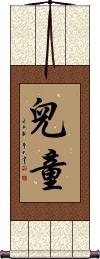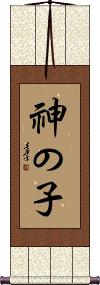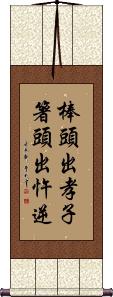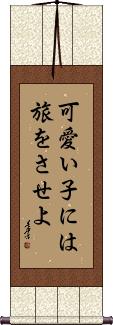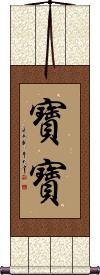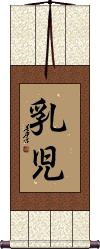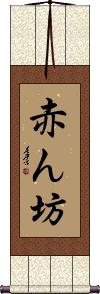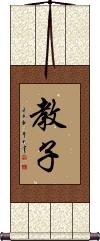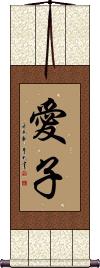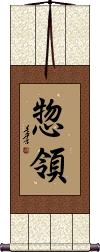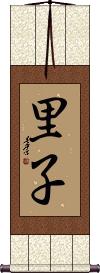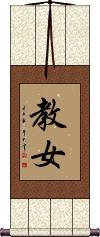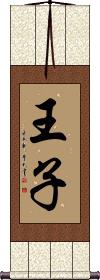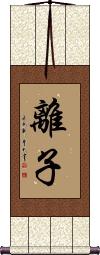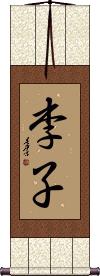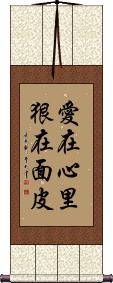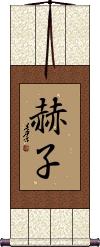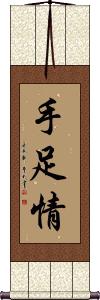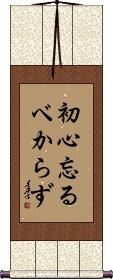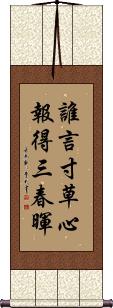Many custom options...
And formats...

Child in Chinese / Japanese...
Buy a Child calligraphy wall scroll here!
Personalize your custom “Child” project by clicking the button next to your favorite “Child” title below...
1. Child
2. Child of God
3. Spare the Rod, Spoil the Child
4. If you love your child, send them out into the world
5. Love Between Child and Parents
6. Love Gems / Fruit of Love / Children
7. Baby
9. Beloved Son / Beloved Child
10. First Born
11. Riko / Yuriko / Noriko / Satoshi
12. God Daughter
13. Prince
14. Riko
15. Daddy’s Girl / Daddy’s Boy
16. Riko / Momoko
17. Love Your Children, But Discipline Them Too
18. Kagune
19. Forever Family
20. Tung
21. Brotherly and Sisterly Love
Child
兒童 is how to write “child” in Chinese.
There are several ways to write child or offspring in Chinese, but this is the best form for calligraphy, or written (versus oral) form.
If children are essential to you, this might be the scroll you want. Or if you are a child at heart, this also works.
![]() In Japanese, they use a slightly-morphed version of the original Chinese first character. If you want the special Japanese version, please click on the Kanji image shown to the right, instead of the button above. Note: Japanese people would still be able to understand the Chinese version and vice versa.
In Japanese, they use a slightly-morphed version of the original Chinese first character. If you want the special Japanese version, please click on the Kanji image shown to the right, instead of the button above. Note: Japanese people would still be able to understand the Chinese version and vice versa.
See Also: Family
Child of God
Child of God
Spare the Rod, Spoil the Child
棒頭出孝子箸頭出忤逆 literally translates as:
A stick (or switch) produces filial sons; chopsticks produce disobedient [ones].
Figuratively, this means:
Strict discipline produces dutiful children, whereas indulgence produces disobedient ones.
This proverb is very similar to this English proverb:
“Spare the rod and spoil the child.”
If you love your child, send them out into the world
可愛い子には旅をさせよ is a Japanese proverb that means “If you love your children, send them out on a journey into the world.”
This is kind of similar to the western phrase, “Spare the rod and spoil the child.”
More literally, this reads, “Cute child, a journey granted.”
That “granted” could also be understood as “should be initiated.”
Note: Because this selection contains some special Japanese Hiragana characters, it should be written by a Japanese calligrapher.
Love Between Child and Parents
Love Gems / Fruit of Love / Children
Baby
寶寶 is how Chinese people express “baby.”
The word is composed of the same character twice, and therefore literally means “double precious” or “double treasure.”
This would be a nice wall scroll to put either inside or by the door of your baby's room (not on the door, as wall scrolls swing around wildly when hung on doors that open and close a lot).
Baby
Baby
God Son / God Child
Beloved Son / Beloved Child
First Born
Riko / Yuriko / Noriko / Satoshi
God Daughter
教女 is the title for a female child, which you have a sworn duty to raise should the girl's parents die.
The second character specifically designates that we are talking about a female child, thus the title God Daughter.
See Also: Family
Prince
王子 is prince in Chinese characters and Japanese Kanji.
If you look at the meaning of each character, the first means king, and the second means son (or child). Thus, “King's Son,” “Son of the King,” or “King's Child” is the literal meaning of this title.
Riko
Daddy’s Girl / Daddy’s Boy
Riko / Momoko
Love Your Children, But Discipline Them Too
Kagune
Forever Family
永遠的家 is a special phrase that we composed for a “family by adoption” or “adoptive family.”
It's the dream of every orphan and foster child to be formally adopted and find their “forever family.”
The first two characters mean forever, eternal, eternity, perpetuity, immortality, and/or permanence. The third character connects this idea with the last character which means “family” and/or “home.”
See Also: Family
Tung
董 is a Cantonese surname that romanizes as Tung.
This is not the only Tung: The surname Tung is primarily of Chinese origin, a Cantonese/Mandarin romanization for several Chinese characters (like 董, 童, 佟, 東) meaning things like "supervise," "child," or "east," often linked to leadership or nature (pine tree). It's also found in Vietnamese contexts as "Tùng," meaning "pine," and signifies a connection to East Asian heritage, prevalent in China, Hong Kong, US, and Southeast Asia.
Brotherly and Sisterly Love
手足情 is the love between siblings.
When you love, protect, care for, and have a deep bond that only brothers or sisters can.
The actual translation is “Hand and Foot,” but the relationship between brothers or sisters is like that of hands and feet. They belong together and complete the body. Even though this says “hand and foot,” it will always be read with the brotherly and sisterly love meaning in Chinese.
Note: During the past 20 years, the “One child policy” in China is slowly making this term obsolete.
Never Forget Your First Resolution
Never Lose Your Beginner's Spirit
初心忘るべからず is an old Japanese proverb that suggests you try to never forget the enthusiasm you had as a child when you try new things (or even face the day-to-day). Basically, avoid having the mundane attitude that many people get with age.
You'll find this Japanese proverb translated in a few different ways. Here are some of them:
Don't forget your first resolution.
Never forget your childlike enthusiasm.
Forget not the beginner's mind.
Try never to lose your initial enthusiasm (freshness of attitude).
Note: This is sometimes written as 初心忘る可からず. The one shown above is used about 10x more often. There’s only one character difference between the two versions.
Note: Because this selection contains some special Japanese Hiragana characters, it should be written by a Japanese calligrapher.
Appreciation and Love for Your Parents
誰言寸草心報得三春暉 is the last line of a famous poem. It is perceived as a tribute or ode to your parents or mother from a child or children that have left home.
The poem was written by Meng Jiao during the Tang Dynasty (about 1200 years ago). The Chinese title is “You Zi Yin” which means “The Traveler's Recite.”
The last line as shown here speaks of the generous and warm spring sunlight which gives the grass far beyond what the little grass can could ever give back (except perhaps by showing its lovely green leaves and flourishing). The metaphor is that the sun is your mother or parents, and you are the grass. Your parents raise you and give you all the love and care you need to prepare you for the world. A debt that you can never repay, nor is repayment expected.
The first part of the poem (not written in the characters to the left) suggests that the thread in a loving mother's hands is the shirt of her traveling offspring. Vigorously sewing while wishing them to come back sooner than they left.
...This part is really hard to translate into English that makes any sense but maybe you get the idea. We are talking about a poem that is so old that many Chinese people would have trouble reading it (as if it was the King James Version of Chinese).
This in-stock artwork might be what you are looking for, and ships right away...
Asking the Child Under Pinetree Painting
Discounted Blemished
Gallery Price: $65.00
Your Price: $36.00
Gallery Price: $60.00
Your Price: $36.88
Gallery Price: $60.00
Your Price: $36.88
These search terms might be related to Child:
Baby
Beloved Daughter
Beloved Son / Beloved Child
Daughter
Evil Cause, Evil Result
Father and Daughter
Father and Son
First Born Daughter
First Born Son
God Daughter
God Son / God Child
Grand Daughter
Mother and Daughter
Mother and Son
My Son
No One Knows a Son Better Than the Father
Son
Sun Wukong / Son Goku
The following table may be helpful for those studying Chinese or Japanese...
| Title | Characters | Romaji (Romanized Japanese) | Various forms of Romanized Chinese | |
| Child | 兒童 儿童 | jidou / jido | ér tóng / er2 tong2 / er tong / ertong | erh t`ung / erhtung / erh tung |
| Child of God | 神の子 | kami no kou kaminokou kami no ko | ||
| Child of God | 神的孩子 | shén de hái zi shen2 de hai2 zi shen de hai zi shendehaizi | shen te hai tzu shentehaitzu |
|
| Spare the Rod, Spoil the Child | 棒頭出孝子箸頭出忤逆 | bàng tóu chū xiào zǐ zhù tóu chū wǔ nì bang4 tou2 chu1 xiao4 zi3 zhu4 tou2 chu1 wu3 ni4 bang tou chu xiao zi zhu tou chu wu ni | pang t`ou ch`u hsiao tzu chu t`ou ch`u wu ni pang tou chu hsiao tzu chu tou chu wu ni |
|
| If you love your child, send them out into the world | 可愛い子には旅をさせよ | kawaii ko ni wa tabi o sa seyo kawaiikoniwatabiosaseyo kawai ko ni wa tabi o sa seyo | ||
| Love Between Child and Parents | 父慈子孝 | fù cí zǐ xiào fu4 ci2 zi3 xiao4 fu ci zi xiao fucizixiao | fu tz`u tzu hsiao futzutzuhsiao fu tzu tzu hsiao |
|
| Love Gems Fruit of Love Children | 愛の結晶 | ainokesshou ainokesho | ||
| Baby | 寶寶 宝宝 | bǎo bao / bao3 bao / bao bao / baobao | pao pao / paopao | |
| Baby | 乳児 | nyuu ji / nyuuji / nyu ji | ||
| Baby | 赤ん坊 | akan bou / akanbou / akan bo | ||
| God Son God Child | 教子 | jiào zǐ / jiao4 zi3 / jiao zi / jiaozi | chiao tzu / chiaotzu | |
| Beloved Son Beloved Child | 愛子 爱子 | manago / aiko / yoshiko | ài zǐ / ai4 zi3 / ai zi / aizi | ai tzu / aitzu |
| First Born | 惣領 | souryou / soryo | ||
| Riko Yuriko Noriko Satoshi | 里子 | riko / yuriko / noriko / satoshi / satoko | ||
| God Daughter | 教女 | jiào nǚ / jiao4 nv3 / jiao nv / jiaonv | chiao nü / chiaonü | |
| Prince | 王子 | ou ji / ouji / o ji | wáng zǐ / wang2 zi3 / wang zi / wangzi | wang tzu / wangtzu |
| Riko | 離子 | riko | lí zǐ / li2 zi3 / li zi / lizi | li tzu / litzu |
| Daddy’s Girl Daddy’s Boy | お父さん子 | otousanko / otosanko | ||
| Riko Momoko | 李子 | riko / momoko / satoko | ||
| Love Your Children, But Discipline Them Too | 愛在心里狠在面皮 / 愛在心里狠在麵皮 爱在心里狠在面皮 | ài zài xīn lǐ hèn zài miàn pì ai4 zai4 xin1 li3 hen4 zai4 mian4 pi4 ai zai xin li hen zai mian pi aizaixinlihenzaimianpi | ai tsai hsin li hen tsai mien p`i ai tsai hsin li hen tsai mien pi |
|
| Kagune | 赫子 | kagune / kakuko | ||
| Forever Family | 永遠的家 永远的家 | yǒng yuǎn de jiā yong3 yuan3 de jia1 yong yuan de jia yongyuandejia | yung yüan te chia yungyüantechia |
|
| Tung | 董 | dǒng / dong3 / dong | tung | |
| Brotherly and Sisterly Love | 手足情 | shǒu zú qíng shou3 zu2 qing2 shou zu qing shouzuqing | shou tsu ch`ing shoutsuching shou tsu ching |
|
| Never Forget Your First Resolution | 初心忘るべからず / 初心忘る可からず 初心忘るべからず | sho shin wasu ru be ka ra zu shoshinwasurubekarazu | ||
| Appreciation and Love for Your Parents | 誰言寸草心報得三春暉 谁言寸草心报得三春晖 | shuí yán cùn cǎo xīn bào dé sān chūn huī shui2 yan2 cun4 cao3 xin1 bao4 de2 san1 chun1 hui1 shui yan cun cao xin bao de san chun hui | shui yen ts`un ts`ao hsin pao te san ch`un hui shui yen tsun tsao hsin pao te san chun hui |
|
| In some entries above you will see that characters have different versions above and below a line. In these cases, the characters above the line are Traditional Chinese, while the ones below are Simplified Chinese. | ||||
Successful Chinese Character and Japanese Kanji calligraphy searches within the last few hours...
